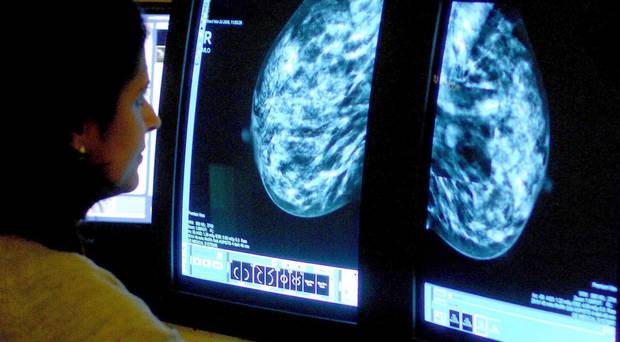

By Jonathan Bell
January 9 2019
Secretary of State Karen Bradley has been urged to intervene in the management of the Northern Ireland health service as latest government figures show a further deterioration in waiting times for people getting their first treatment for cancer.
The UUP said longer waiting times were “taken for granted” in Northern Ireland when it should be treated as a scandal.
On Tuesday the Department of Health revealed that in September, 369 people begun treatment for cancer. For 61.8% or 228 of those that was within the 62-day target for treatment. That compared to 66.4% in August – or 267 people. And 62.4%, or 232 people in September 2017.
The figures also show that in September last year 1,100 people were seen by a breast cancer specialist for a first assessment. Almost three quarters (74.5%) were seen within the 14-day target. That was down on the 79.5% in August and 75.6% for the same month in 2017.
“It’s outrageous and totally unfair to force so many people to wait for so long,” said UUP MLA Roy Beggs.
“Targets are set for cancer treatment because there is very sound medical evidence that the longer a patient has to wait for treatment, the greater the risk that they may ultimately come to harm. That’s what makes these missed targets so serious and inexcusable.”
He added: “If England mirrored our waiting times it would be a scandal, but in Northern Ireland it is just taken for granted now that every official publication of waiting times will be worse than the one that came before.
“On the second anniversary of the collapse of the Executive we are now long past the point at which the Secretary of State can continue to sit back and do nothing while local people suffer.”
Cancer support charities said those facing a battle with the disease and their families faced enormous stress appealing to local politicians to restore power sharing so that important decisions can be taken.
“They are fearful that their condition will worsening and will require more complex treatment,” said Roisin Foster, chief executive of Cancer Focus NI.
“We know that early diagnosis and treatment saves lives and for many cancer patients time is not a luxury they can afford.
“We need our politicians back in Stormont to improve waiting times for cancer patients. The sooner we have our new cancer strategy in place the better.”
Alliance MLA Paula Bradshaw said she is “extremely worried” by the figures and said further funding should be provided for diagnostic treatment, vaccine programmes and community education programmes, in addition to setting up a workforce recruitment drive and staff development programme.
“All of this activity should be encompassed within a comprehensive cancer strategy for Northern Ireland, and while there have been some murmurings about such a strategy forthcoming, there has been no evidence of its formulation or engagement around its content,” she added.
“My mother passed from cancer in 2018 and I witnessed first-hand the devastating impact on the patient and their families and carers.
“I also saw the huge effort and range of treatment our hardworking cancer healthcare staff put into her treatment and care, and I firmly believe they deserve more resources and more colleagues.
“In short, we need our Department of Health to accelerate its efforts to bring forward this cancer strategy as soon as possible, to ensure the upward trend in cancer is arrested and then reversed.”
Macmillan Cancer support said the Bengoa report – which recommended wide scale reform of the health service – showed how best to improve services.
“Health care professionals continue to work tirelessly to support patients and to progress change within cancer services, but priority needs to be given to the development of a sustainable cancer strategy to ensure that we have a healthcare system, supported by the right health and care workforce with the right skills, to deliver the world-class cancer care that patients deserve now and in the future,” Heather Monteverde from the charity said.
“At the end of last year, the Department for Health announced its intention in light of recent legislation, to determine whether it might be possible to approve Cancer Strategy development in the absence of an Assembly. We eagerly await the outcome.”
A Health and Social Care Board spokesperson said: “The assessment and treatment of all patients referred to hospital because of a suspicion of cancer remains a priority for HSC and clinicians continue to prioritise the most urgent patients. That said performance is not good enough and that is a matter of concern.”
“Increased demand for services coupled with recruitment challenges continue to impact negatively on performance. Transformation funding has enabled non-recurrent funding of £30m to be allocated in 2018/19 to undertake additional elective activity to reduce waiting lists by targeting those patients with the highest clinical priority, including those with suspected or confirmed cancer and those waiting the longest for assessment and treatment.
“Whilst this additional funding will benefit some patients in the short term sustained improvement can only be achieved through transforming the way services are delivered.
“In Northern Ireland, the outcomes for patients with cancer are comparable to other parts of the United Kingdom, however there is room for improvement.
“The good news is that 6 out of 10 people with a diagnosis of cancer live more than 5 years. This represents a huge improvement over the last 20 years which is, in no small part, due to earlier diagnosis as well as access to better treatments”.
Belfast Telegraph Digital
Parliamentary reports show first speaker only - follow this lnk for the full transcription.
Articles may come from parliamentary reports, various public news feeds and Google News Search. Content is republished here for context. Copyright is respected and remains with the original author at all times. Original Article:https://www.belfasttelegraph.co.uk/news/northern-ireland/bradley-must-intervene-as-cancer-waiting-times-in-northern-ireland-continue-to-deteriorate-says-uups-beggs-37696273.html


